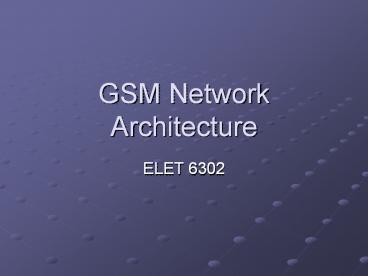GSM Network Architecture PowerPoint PPT Presentation
1 / 12
Title: GSM Network Architecture
1
GSM Network Architecture
- ELET 6302
2
Motivation
3
Outline
- Introduction and history.
- GSM architecture.
- Implementation.
- Technology and standards.
- Summary
4
Introduction
- Global System for Mobile Communication (GSM)
- Anybody 500 million users (may 2001)
- Anywhere 168 countries (may 2001)
- Any media voice, messaging, data, multimedia
Source Hillebrand, 1
5
GSM Architecture
Network Management Center
Home Location Register
BTS Base Transceiver Station AuC
Authentication Center OMC Operation and
Maintenance Center PSTN Public Switched
Telephone Network ME Mobile Equipment
AuC
Equipment ID
OMC
Visitor Location Register
Subscriber Identity Module
BTS
Mobile switching center
ME
Data communication network
Subscriber Identity Module
Base station controller
BTS
ME
Subscriber Identity Module
BTS
ME
PSTN
Source Stallings, 313 Source Mehrotra, 27
6
GSM Architecture
MS Transmission Band 890 915 MHZ
BS Transmission Band 935 960 MHZ
45 MHz
7
SIM (Subscriber Identity Module)
Billions of Calls Millions of Subscribers Thousand
of Different Types of Telephones Hundreds of
Countries Dozens of Manufacturers. And only one
Card The SIM
- Administrative data
- Security data
- Subscriber data
- Roaming data
- PLMN (Public Land Mobile Network
Source Hillebrand, 369 http//ucables.com/product
s/simcards/
8
Implementation
Receiver
gtChannel Decoding gtDe-Interleaving gtRe-formatting
Voice decoding
Deciphering
Demodulation
gtChannel encoding gtInterleaving gtBurst generation
Voice encoding
Ciphering
Modulation
Amplifier
Transmitter
Central processor, clock and tone, internal bus
system, keyboard (HMI)
SIM Subscriber Identity Module
Source Heine, 14
9
Implementation
HF Transmitter (HF-TX)
Abis-Interface
Output filter
TRX
Transmission system
Slow frequency hopping
Digital signal processing (NF functionality)
HF Receiver (HF-RX)
Input filter
OM Module
Operation and maintenance functionality/clock
distribution
Block Diagram of a BTS with one TRX
Source Heine, 20
10
GSM Variants
Source Bekkers, 299
11
Summary
- Network architecture
- Implementation
- Voice application
- Data application
12
References
- Bekkers, Rudi. Mobile Communications Standards
GSM, UMTS, TETRA, and ERMES. Norwood, MA Artech
House, Inc., 2001. - Halonen, Romero, and Melero. GSM, GPRS, and EDGE
Performance Evolution Towards 3G/UMTS. England
John Wiley Sons Ltd., 2003. - Hillebrand, Friedhelm. GSM and UMTS The Creation
of Global Mobile Communications. England John
Wiley Sons Ltd., 2002. - Heine, Gunnar. GSM Networks Protocols,
Terminology, and Implementation. Norwood, MA
Artech House, Inc., 1999. - Mehrotra, Asha. GSM System Engineering. Norwood,
MA Artech House, Inc., 1997. - Harte, Levine, and Livingston. GSM Superphones.
United States APDG Publishing, Inc. A Division
of McGraw-Hill, 1999.

